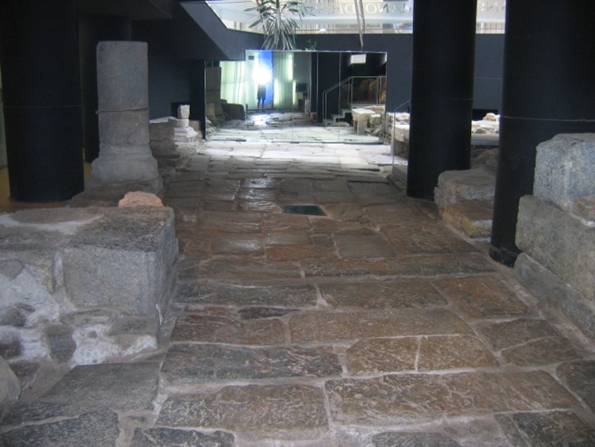37.35.813N 0.58.799W
Today it was a serious tourist assault on Cartagena. First stop was tourist information
to find out about the “Cartagena Card” we had read about yesterday.
Surprisingly tourist information don’t sell them we had to go elsewhere. So
after a short walk (back the way we had come) we found the place to buy the “Cartagena card”.
The card gives us cheap access to the historic sites in Cartagena. So off we went on a mission.
A Brief History of Cartagena – Founded in
229 BC. The Romans conquered it in 209BC. After a period of being ransacked by
the Goths and recovered by the Byzantines it was conquered by the Arabs in
1245AD plus lots of other things!
Casa de La Fortune (The house of fortune) –
This is the remains of a roman house built in 1 BC. The remains are under another
building. There is a mosaic floor and the remains of the street
Muralla Punica (The Punic Wall) – The wall was
built in the latter stages of 3 BC. It was built to defend the city. It had
living accommodation built in the walls. The remains of the walls were found
when someone wanted to build a car park. An archeological survey was done to
look for remains of the hermitage. They found the burial area of the Hermitage
and the Punic wall. The Hermitage dates back to 16th to 19th
centuries. We think any builders in Cartagena
must dread seeing happy faces of archeologists – the car park never was
built.
Decumano – A Roman street
excavated that was built in 1 AD and changed again in 4-5 AD. Once again modern
building had been built above the remains – the only “intrusion”
was the matt black pillars supporting the building above.
Augusteun – A public
building renowned for its decorative wealth. A place where priests rendered
homage to the emperor Augustan.
Civil War Air Raid Shelter and Museum – A man-made
tunnel in a hill used when Spain
was in a civil war from 1936 for 3 years.
Military Museum – We saw a
series of rooms full of cannons from the 16th century to modern day.
Then we had the room full of artillery for the aforementioned cannons. Then personal
equipment, uniforms, radars, a room full of engines (not quite sure of the military
connection apart from being painted camouflage), a room full of optical
targeting equipment and more. Have you got the idea yet - this place is huge.
We walked really fast and it still took over an hour. Oh and there is a room
full of military models (it even won the Guinness book of records for the
largest military model collection). I don’t think we gave it justice but
it wasn’t quite our thing anyway.
This evening we collapsed back on board.

Decumano – Roman
street excavated. The black pillars hold the new
building built above it.

The remains of the Muralla Punica (The Punic Wall). No car
parks here!

The crypt of the Hermitage

Everywhere in the city excavations have been done and
remains are evident and incorporated into the modern city

The archeologist have a life’s time work in Cartagena – this picture
was taken in the centre of the town.





